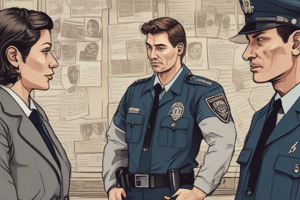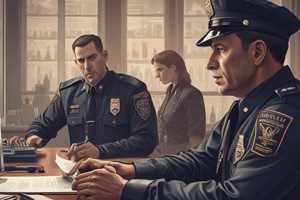Podcast
Questions and Answers
What should be done if a complainant is under the influence of an intoxicant?
What should be done if a complainant is under the influence of an intoxicant?
- The complainant should be denied the right to file a complaint.
- An investigation must begin immediately.
- The complaint must be filed immediately.
- The conditions should be noted on a separate sheet. (correct)
Where can a complainant submit their completed report if they can't do it at the police facility?
Where can a complainant submit their completed report if they can't do it at the police facility?
- They cannot submit the report elsewhere.
- Only by mail to the police department.
- Only at the main police station.
- At any police station or approved location listed online. (correct)
What should follow the member's observations on the separate sheet of paper?
What should follow the member's observations on the separate sheet of paper?
- An approval from a supervisor.
- A signature of the member making the notations. (correct)
- A copy of the complaint form.
- A recommendation for further action.
What type of condition must be described regarding the complainant?
What type of condition must be described regarding the complainant?
What happens if a complaint is resolved satisfactorily?
What happens if a complaint is resolved satisfactorily?
What must happen before notations are made on the separate sheet of paper?
What must happen before notations are made on the separate sheet of paper?
What is the primary purpose of the interview conducted by a commander or supervisor?
What is the primary purpose of the interview conducted by a commander or supervisor?
What type of information is NOT included in the copy of the Complaint Form provided to the complainant?
What type of information is NOT included in the copy of the Complaint Form provided to the complainant?
What must a parent or legal guardian do when an individual under seventeen is involved in an incident?
What must a parent or legal guardian do when an individual under seventeen is involved in an incident?
Which statement is true regarding the acceptance of complaints at police facilities?
Which statement is true regarding the acceptance of complaints at police facilities?
What condition must be met for a paper form Complaint Report to be investigated?
What condition must be met for a paper form Complaint Report to be investigated?
What happens if a complainant refuses to sign the Complaint Form?
What happens if a complainant refuses to sign the Complaint Form?
Which of the following must be included in the complaint description?
Which of the following must be included in the complaint description?
What form option does not require notarization for the complaint process?
What form option does not require notarization for the complaint process?
What is the consequence of submitting an unverified paper Complaint Form?
What is the consequence of submitting an unverified paper Complaint Form?
Who will be listed as a co-complainant in an incident involving a minor?
Who will be listed as a co-complainant in an incident involving a minor?
Under what condition might a member be required to take a polygraph examination?
Under what condition might a member be required to take a polygraph examination?
What role does the Chief play in the process of recommending a polygraph examination for a member?
What role does the Chief play in the process of recommending a polygraph examination for a member?
If the Chief disagrees with the recommendation for a polygraph examination, what must they do?
If the Chief disagrees with the recommendation for a polygraph examination, what must they do?
What happens if the Executive Director continues to recommend a polygraph examination after the Chief's disagreement?
What happens if the Executive Director continues to recommend a polygraph examination after the Chief's disagreement?
What is the minimum notice period a member will receive before a scheduled polygraph examination?
What is the minimum notice period a member will receive before a scheduled polygraph examination?
What may constitute reasonable factors supporting a polygraph examination?
What may constitute reasonable factors supporting a polygraph examination?
What is the first step that must occur before a member can be directed to submit to a polygraph examination?
What is the first step that must occur before a member can be directed to submit to a polygraph examination?
What happens if a complainant's polygraph examination supports their allegations?
What happens if a complainant's polygraph examination supports their allegations?
What is the primary responsibility of the Department regarding complaints?
What is the primary responsibility of the Department regarding complaints?
What must members do when requested by an individual?
What must members do when requested by an individual?
Who has the final authority to impose discipline for formal complaints?
Who has the final authority to impose discipline for formal complaints?
Which of the following is a requirement for submitting a complaint?
Which of the following is a requirement for submitting a complaint?
What is prohibited during the complaint process?
What is prohibited during the complaint process?
What opportunity is provided to members facing a complaint?
What opportunity is provided to members facing a complaint?
Which of the following individuals has the right to file a complaint?
Which of the following individuals has the right to file a complaint?
When are complaints processed?
When are complaints processed?
What happens if the Chief disagrees with the OCC's recommendation?
What happens if the Chief disagrees with the OCC's recommendation?
What is the final step if the Executive Director agrees with the Chief's recommendation?
What is the final step if the Executive Director agrees with the Chief's recommendation?
Who receives a final copy of the Summary of Analysis?
Who receives a final copy of the Summary of Analysis?
If additional information is needed, to which entity is the file returned?
If additional information is needed, to which entity is the file returned?
What is the timeframe for presenting the Summary of Analysis to the Chief and/or Board?
What is the timeframe for presenting the Summary of Analysis to the Chief and/or Board?
In which circumstance does a recommendation from the OCC become a final determination?
In which circumstance does a recommendation from the OCC become a final determination?
What must be included in the files forwarded to the Chief post-investigation?
What must be included in the files forwarded to the Chief post-investigation?
If the Executive Director does not agree with the Chief's recommendation, what happens next?
If the Executive Director does not agree with the Chief's recommendation, what happens next?
Flashcards are hidden until you start studying
Study Notes
Complaints Process Overview
- Members should consult the current Memorandums of Agreement with Fraternal Order of Police Lodges 99 and 102 for details.
- The Department is responsible for receiving, reviewing, and forwarding complaints to the OCC and conducting investigations through the Internal Affairs Unit (IAU).
- All complaints must be processed timely and impartially.
Member Responsibilities
- Members must identify themselves by name and badge/serial number upon request.
- They are entitled to respond to allegations made against them.
- Members should avoid unnecessary contact with complainants.
Recording Devices Policy
- Use of any recording devices (including phones) by members, complainants, or third parties is prohibited during formal statements and complaint reviews.
Authority and Discipline
- The Chief of Police holds final authority over disciplinary actions resulting from OCC-referred complaints.
Filing Complaints
- Complaints can be filed by:
- Individuals aged 17 or older involved in the incident.
- Certified juveniles under 17 who have legal documentation.
- Parents/legal guardians of individuals under 17, who must accompany and co-sign the Complaint Report Form.
- Complaints can be accepted at any police facility, irrespective of the occurrence's location.
Complaint Form Completion
- The complaint process initiates with filling out the Complaint Form, available online or in paper.
- Paper forms must be signed and verified following Missouri Revised Statutes for investigation; unverified complaints will not be processed.
- Complaints must detail the incident's date, time, and location.
Complainant Credibility Assessment
- Staff must record observations if the complainant shows signs of intoxication, mental distress, or other credibility issues.
- Documentation of physical condition and injuries related to the complaint must be included.
Resolution Process
- A supervisor may attempt to resolve the complaint informally; if successful, a Resolved Complaint Form will be filed.
- Members generally are not required to take a polygraph unless the complainant has passed one and inconsistencies warrant further investigation.
Polygraph Examination Procedures
- Examinations of members are scheduled via Chief's Office communication, with at least 48 hours' notice.
- Results are to be sent to the Chief alongside the complaint file.
Investigation and Reporting
- After investigations, the OCC may seek additional information if necessary.
- A final Summary of Analysis, with OCC letters, must be presented to the Chief/Board within 45 days post-investigation.
Chief's Recommendations and Final Determination
- If the Chief agrees with OCC recommendations, they become final.
- If disagreed upon, the Chief can provide written feedback to the OCC within 30 days for reconsideration.
- Following discussions, adjusted recommendations may be prepared and forwarded to the Chief for final determination.
Studying That Suits You
Use AI to generate personalized quizzes and flashcards to suit your learning preferences.



